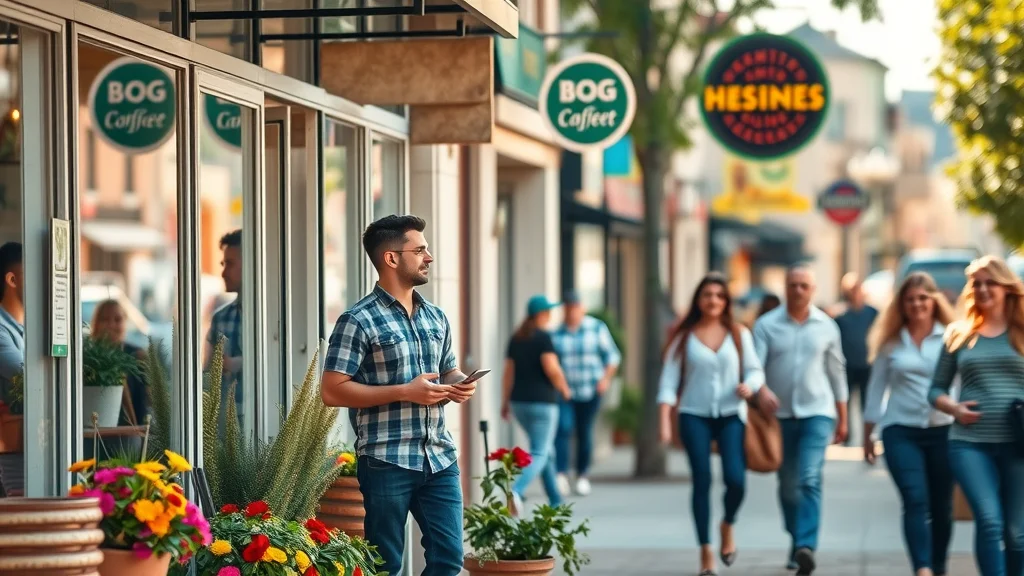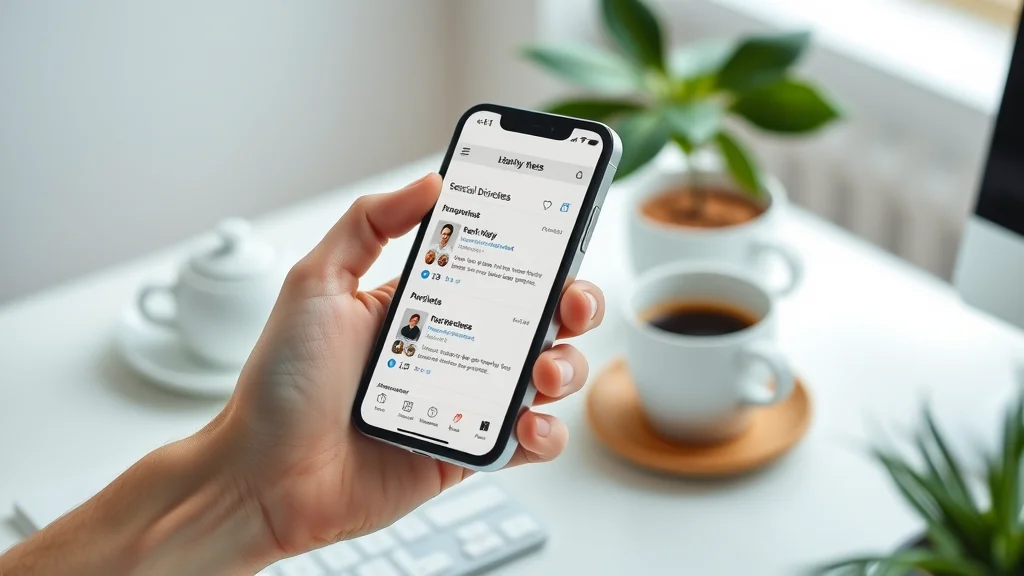Did you know? Local businesses that master local link building can witness up to a 50% rise in search visibility within just one year. In a competitive landscape where every shopfront is vying for attention, building powerful local links isn’t just a strategy—it’s the engine that drives neighborhood growth and online discovery. Whether you own a boutique, café, or service shop, this comprehensive guide unlocks the playbook for gaining powerful backlinks, elevating your local SEO, and standing out in Google’s local search results.

Unveiling the Power of Local Link Building: Surprising Statistics for Local Businesses
"According to industry data, businesses implementing effective local link building strategies see up to 50% increases in search visibility within a year." – Search Engine Land
The transformative impact of local link building is no exaggeration. Recent reports show that companies investing in strategic local links consistently outperform their competition in local SEO rankings. In fact, these businesses are more likely to appear in the coveted “local pack”—the map listings you see at the very top of Google Search—and to reap significant boosts in website traffic and real-world footfall alike. For service-based companies, the effect is equally pronounced; powerful local backlinks act as digital word-of-mouth, lending extra trust and credibility in your own community.
Beyond visibility, the right local link building tactics drive highly targeted traffic to your site, increase online inquiries, and improve your chances of conversion. A single reputable link from a local news site or influential local blog can send qualified leads straight to your business profile or website. That’s why understanding the methods behind local link acquisition—and recognizing what’s at stake—puts your business at a major advantage as local SEO competition heats up.
Why Local Link Building Matters for Local SEO
- Local link building enhances local search rankings dramatically
- High-quality local links drive relevant, converting traffic
- Local SEO relies on trusted local backlinks for Google’s local pack

What You'll Learn About Local Link Building
- The foundations of local link building and its SEO impact
- Proven tactics for earning local backlinks
- How to audit competitors’ local link profiles
- Best outreach practices for local link building
- Common mistakes to avoid
Understanding Local Link Building: Key Concepts
What Is Local Link Building and How Does It Differ From General Link Building?
Local link building is the process of securing backlinks from websites that have a local connection to your business, such as directories, blogs, news outlets, or neighboring enterprises. Unlike general link building—which aims for links from anywhere on the web, often with an emphasis on high domain authority—local link building zeroes in on local relevance. It’s about strengthening your business’s ties within your geographic community and telling search engines that your enterprise is a credible, valued player in a specific area.
For example, while a global e-commerce company might chase backlinks from top-tier publications, a neighborhood bakery thrives by being listed on a city food blog, mentioned in a local news site, or included in a chamber of commerce directory. These local links send powerful relevance signals to Google for local searches, helping your business appear in both the traditional search results and the Google local pack that tops so many queries. Local link building is all about quality, context, and proximity, offering a unique set of strategies (and big rewards) for small businesses.
Types of Local Links for Local Businesses
When it comes to local link building, knowing where these valuable links can come from is half the battle. Local links come in many forms—each having a unique impact on your local SEO and Google Business Profile visibility.
| Link Type | Description | Example |
|---|---|---|
| Local Directory | Listings for local businesses | Chamber of Commerce listing |
| Local News Site | Stories about your community | Local online newspaper |
| Local Blog | Community bloggers and influencers | Food blogger reviewing your store |
Each of these local backlink sources not only expands your online footprint but also builds much-needed credibility and trust. The aim is to appear wherever your audience—and Google—looks for trusted information about local businesses like yours.

The Impact of Local Link Building on Local SEO and Search Visibility
How Local Links Influence Google’s Local Pack Rankings
Local link building directly determines your placement in Google’s “local pack”—that prominent block of map-based results displayed for searches like “best pizza near me.” Google’s algorithm looks at both relevance and authority in your area, and frequent, trusted mentions from local sources act as a virtual endorsement. Meaningful local links can dramatically boost your local search ranking, placing your business within sight of those eager to buy or visit.
For instance, a backlink from your town’s news site, a listing in local directories, or a review from a community blogger sends unmistakable signals to Google’s local search. These signals make it clear that your business isn’t just legitimate—it’s a known, trusted resource in the neighborhood. When you regularly appear in local contexts across the web, you improve your chances of being chosen by Google for prime spots in local search results, driving more website visits, calls, and in-store visits.
Local Backlinks vs. Domain Authority: What Matters Most?
Many business owners mistakenly believe that all high-authority links are of equal value. In local SEO, however, local relevance often outweighs sheer domain authority. A backlink from a well-respected, regionally-focused news site or popular city blog can have far more impact on your local search visibility than a generic link from a national website with higher domain authority.
The local context is what counts: is your business being talked about in the same digital places potential customers search for local recommendations? That’s why focusing on relevant, context-rich local backlinks gives you a competitive edge. Google’s algorithms value authenticity and trust, so it’s better to be mentioned by five influential neighbors than by fifty unrelated, distant websites.
The Role of Local Link Building in Local Search Results
Local link building not only drives placements in the local pack but also increases your visibility in traditional search results. These links help search engines connect the dots between your Google Business Profile, your physical address, and your website, reinforcing the relevance of your business in a localized context.
Simply put, every authentic, relevant local link you earn creates another pathway for both search engines and potential customers to discover you. This is especially powerful when your competitors neglect local link building, allowing you to rise faster with a focused, neighborhood-driven SEO strategy.

Essential Local Link Building Strategies for Small Businesses
Step-by-Step Guide: Building Your First Local Backlink
- Identify relevant local directories
- Find local community websites
- Leverage existing business partnerships
Starting your local link building journey can seem daunting, but it’s much simpler once you break it down. Begin by researching top local directories—such as your city’s chamber of commerce, Better Business Bureau, and established neighborhood business groups. Ensure your business information is accurate, up-to-date, and includes a link to your website. Next, search for community blogs or event sites featuring local companies (use keywords like “your city + business blog”).
Don’t overlook partnerships: do you collaborate with a local florist or sponsor a youth sports team? Ask for a mention and backlink on their site. Even small gestures, like co-hosting an event, can lead to powerful, highly relevant local links that Google values and future customers notice.
As you explore these foundational tactics, it can be helpful to see how local businesses leverage real-world opportunities for link building. For example, when a company secures a major local achievement—such as a significant refinance or expansion—it often attracts coverage from local news outlets and business directories, resulting in valuable backlinks. A recent case in point is Burton House’s $55 million refinance loan in Beverly Hills, which not only boosted their visibility but also generated authoritative local mentions that support ongoing SEO growth.
Using Local Business Directories for Reliable Local Links
Listing your company in reputable local directories is the foundation of every effective local SEO strategy. These directories—think Google Business Profile, Yelp, YellowPages, and local chamber sites—not only provide trusted backlinks but also ensure your contact details, address, and hours reach potential customers directly.
Search engines view directory listings as authoritative, consistent information sources. That’s why keeping your profiles updated (and error-free) is critical; mismatched info can hurt your rankings. Remember, quality beats quantity: it’s better to appear in 10 respected directories than in dozens of spammy ones that offer no real value.
Earning Backlinks from Local News Sites and Blogs
A mention from a local news site or influential local blog is one of the most valuable local links you can secure. Think about what makes your business newsworthy: are you launching a new product, supporting a neighborhood cause, or hosting a community event? Draft a short, friendly press release or personalized email (highlighting your local impact) to introduce yourself to local journalists and bloggers.
Focus on building real relationships—offer helpful insights or expert commentary related to your business or industry. Every time a local blogger writes a review or a news site features your story, you not only gain a relevant backlink but also access to new audiences and credibility in your market.
Leveraging Guest Posts for Local Link Building
Guest posting on local blogs, community organization websites, or even neighborhood association newsletters is a fantastic way to earn targeted backlinks. Unlike generic “guest post” outreach, locally-focused guest blogging lets you demonstrate your expertise, provide helpful resources, and naturally mention your own business.
Think beyond self-promotion—contribute a valuable blog post about trends in your industry, offer advice from your experience, or share event recaps that benefit the community. When done right, local guest posting strengthens relationships while earning you highly relevant backlinks and social media shares.
Partnering With Other Local Businesses to Build Links
The local business ecosystem thrives when its members work together. Cross-promotions or joint ventures with neighboring businesses (such as reciprocal links on each other’s websites or collaborative events) create natural opportunities for link building. This tactic also exposes your brand to new customer bases.
Ask your business partners if you can feature each other in resource guides or blog posts. These partnerships not only improve your link profile but also foster deeper connections and greater trust within your local community.
Sponsorships, Events, and Local Community Engagement
Supporting a local charity, sponsoring a community sports team, or participating in festivals gives you authentic, natural link opportunities. Event websites, local nonprofits, and media outlets often list sponsors—with a backlink included.
Genuine engagement with the local community positions your business as a proactive, caring member of the area, earning you not just backlinks but positive press and neighborly goodwill as well.

Advanced Local Link Building Tactics
How to Develop a Winning Local Link Building Strategy
To build a competitive edge, combine foundational link building with more nuanced tactics. Start by analyzing your niche, competitors, and local influencers. Use tools like Ahrefs, Moz, or SEMrush to uncover where top-ranking businesses are being mentioned locally.
Refine your local link building approach by setting goals, documenting outreach efforts, and tracking your position for targeted keywords. Plan quarterly follow-ups with existing links to maintain relationships and refresh outdated content.
Content Marketing Tactics Specifically for Local Businesses
- Creating locally-focused resources
- Running community interviews
- Publishing local market research
Traditional content marketing is great; hyper-local content is even better. Consider developing guides (e.g., “Best Family Restaurants in [City]”), hosting interviews with community leaders or customers, and sharing market research relevant to your area.
These resource-driven pieces are more likely to be linked, shared, and referenced by other local businesses, blogs, and news outlets—and they boost your reputation as an authority in your community.
Unconventional Local Link Building Tactics That Work
Don’t underestimate creativity in local link building. Examples include collaborating with local schools for educational content, co-running contests with nonprofits, or supporting neighborhood art projects—all of which can generate unique link opportunities.
Another overlooked tactic: act as a resource for local journalists. Register with platforms like HARO (Help a Reporter Out) and respond to local leads. Being a go-to expert for local stories can score you authoritative backlinks and long-term relationships with the press.

Competitor Analysis: Reverse Engineering Local Link Building Success
How to Identify Your Competitors’ Local Link Sources
One of the best paths to local SEO success is to study your competition. Use SEO tools to pull back the curtain on where successful local businesses get their backlinks—look for blogs, directories, and news mentions that they’ve secured.
Take note of common link sources, high-value opportunities, and gaps you can exploit. Reach out to sites already friendly to similar local businesses and offer fresh perspectives or collaborations.
| Competitor | Linking Sites | Link Type | Strength |
|---|---|---|---|
| Bakery on Main | SmalltownChamber.com | Directory | High |
| Coffee House | LocalBlogger.com | Blog Mention | Medium |
This reverse-engineering approach lets you prioritize your own outreach efforts, ensuring you focus on proven, high-relevance sources first.
Learning From Local Link Building Campaigns in Your Niche
Analyze what has worked for others in your sector: study the type of content earning links, the tone and approach of outreach, and any community engagement initiatives that resulted in strong backlinks. Adapt these best practices to fit your own brand, adding your unique spin for increased impact.
Remember, there is no need to reinvent the wheel—borrowing and improving upon successful link building strategies is a time-tested way to leap ahead in local search rankings.

Common Local Link Building Mistakes to Avoid
- Ignoring local relevancy in your outreach
- Focusing only on high DA sites and ignoring local opportunities
- Submitting to spammy local directories
"The quality and context of local backlinks often matter more than sheer quantity for local SEO." – Moz
Rushing into link building without a strategy can lead to wasted effort or even harm your rankings. Always qualify directory sites, focus on genuinely local opportunities, and stay away from link farms or unrelated high-authority sites that lack community relevance. It’s the authenticity and intent behind your local links that truly moves the needle.
Measuring the ROI of Local Link Building
Key Local SEO Metrics to Track
Monitor your local search rankings, traffic from local sources, Google Business Profile engagement, and increases in local citations. Use analytics to track which local backlinks generated the most website clicks and customer inquiries.
Tools like Google Search Console, Moz, and BrightLocal make it easy to track position changes, traffic gains, and new backlink acquisitions. Set achievable targets, and review progress monthly to identify which tactics deliver the biggest return.
How to Report on Local Link Building Campaigns
Collect data on acquired backlinks, referring domains, and improvements in your business’s local pack presence. Present results with screenshots and charts to make progress clear to your team or clients. Highlight increases in calls, direction requests, and online reviews that result from your link building activities.
Reporting helps clarify what’s working and justifies future investment in local link building for your business.
Interpreting Results and Adjusting Your Local Link Building Strategy
Use data insights to double down on the most productive tactics—if news site mentions brought the most new customers, focus more on PR. If community blog posts performed best, nurture those relationships further.
Don’t be afraid to tweak your approach regularly as algorithms shift and new local link opportunities arise; staying nimble is key to long-term SEO growth.

People Also Ask: Local Link Building
What is local link building and why is it important?
Local link building involves earning backlinks from locally relevant sources such as directories, local blogs, and community news sites. It's important because it boosts your business’s visibility in local search results and the Google local pack, helping you attract more nearby customers and build trust in your community.
How do I get local backlinks for my business?
You can get local backlinks by listing your business on local directories, collaborating with other local businesses, contributing guest posts to local blogs, engaging with the media for press coverage, and participating in community events or sponsorships.
What are examples of local links?
Examples include your business’s listing in the chamber of commerce, mentions in a city newspaper’s online edition, reviews from local food blogs, and sponsorship acknowledgments on nonprofit event pages.
How do you measure the effectiveness of local link building?
Track changes in your local search rankings, website traffic from local sources, the number and quality of local backlinks acquired, and increases in customer actions from your Google Business Profile or website.
Are local backlinks better than general backlinks for local SEO?
Yes, for local SEO, backlinks from region-specific sources carry more weight than links from general or unrelated sites, as they show Google that your business is relevant and trusted within your community.
What local business directories offer the best local links?
High-value directories include Google Business Profile, Yelp, BBB, your city’s chamber of commerce, and reputable local business associations relevant to your industry or area.
Can small local businesses benefit from local link building?
Absolutely. Even the smallest businesses can see significant growth in online visibility, web traffic, and sales through strategic local link building. It levels the playing field with larger competitors in your area.
Is guest posting on local blogs effective for local link building?
Yes, contributing guest posts to credible local blogs not only earns you high-quality backlinks but also helps you build authority, reputation, and connections within your community.
How to avoid black-hat local link building tactics?
Avoid paid link schemes, spammy link directories, and irrelevant link exchanges. Focus on earning authentic links by providing value, building relationships, and working with trusted local organizations.
FAQs About Local Link Building
-
How long does it take to see results from local link building?
Most businesses start seeing improved rankings and traffic within 3 to 6 months, depending on competition and effort. -
Can nonprofits and charities leverage local link building?
Yes, nonprofits can build strong local links by partnering with businesses, hosting events, or getting press coverage in community outlets and blogs. -
What are the risks of low-quality local backlinks?
Links from spammy or irrelevant sites can hurt your site’s credibility and may even result in search ranking penalties. Prioritize quality and relevance. -
Is it better to build links or earn them organically?
Both are important; proactively pursue relevant opportunities, but also create share-worthy content that naturally attracts quality local links.

Expert Advice: Quotes and Success Stories from Local Link Building
"Partnering with other local businesses for link building led to a 30% boost in our neighborhood foot traffic." – Local Retailer
"A single link from a respected local news site quadrupled our online inquiries." – Small Business Owner

Key Takeaways: Local Link Building Strategies That Drive Results
- Prioritize local relevance and authenticity
- Engage with your community on and offline
- Diversify your tactics for sustainable local SEO
Ready to Grow Your Business? Contact Us Today at 818.716.2097
Conclusion: Embrace local link building as an ongoing strategy. When you focus on authentic, relationship-driven approaches, you’ll amplify your local SEO and attract the customers that matter most.
If you’re eager to take your local SEO to the next level, consider exploring how major business moves and community engagement can further enhance your reputation and authority. Stories like Burton House’s recent financial milestone demonstrate the power of local visibility and strategic partnerships. For a deeper dive into how local business achievements can translate into long-term growth and advanced link building opportunities, check out our coverage of Burton House’s $55 million refinance and its impact on Beverly Hills. Let these insights inspire your next steps as you build a robust, future-proof local SEO strategy.
Sources
To enhance your understanding of local link building and its impact on SEO, consider exploring the following resources:
-
“Local Link Building: What It Is & 8 Proven Strategies to Earn Quality Links” (direction.com)
-
“13 Local Link Building Tactics to Boost Your Visibility” (brightlocal.com)
These articles provide comprehensive strategies and practical tips to effectively build local backlinks, thereby improving your local search rankings and online visibility.
 Add Row
Add Row  Add
Add 




Write A Comment